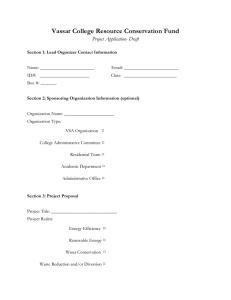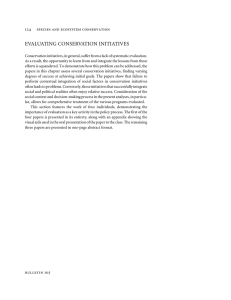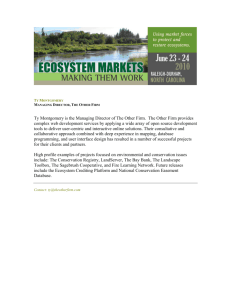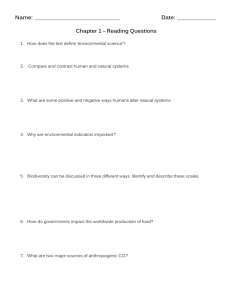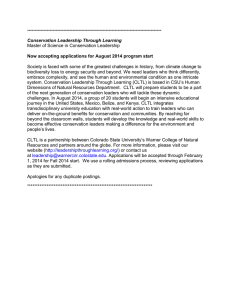A New Vision for Watershed Management S The Conservation Journey
advertisement
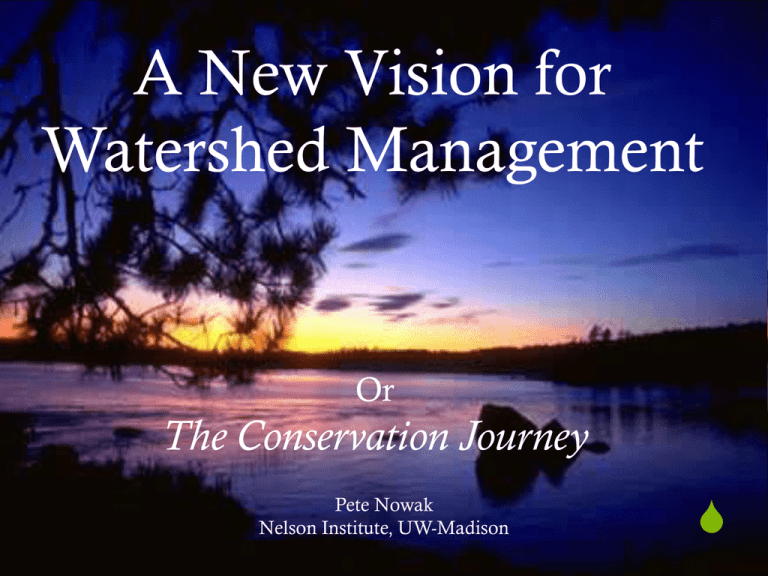
A New Vision for Watershed Management Or The Conservation Journey Pete Nowak Nelson Institute, UW-Madison S In a Context of: Globalization, Information Age, Climate Change, Recession, Market Volatility, Political Polarization S There is no uniform or standardized pathway to conservation S There is no fast and easy conservation journey S More dollars does not mean more conservation S Over-invested in cost-share payments & administrative structures S Under-invested in quantity and support for local conservation professionals “ … the important thing is not to achieve, but to strive.” S “I firmly believe that seeking this state of harmony with the land must be driven by imagination, creativity, innovation, and, dare I say, even a sense of adventure.” Conservationist as Guides Solving local resource management problems S Success based on experience, training, imagination and creativity. S Diversity in landscapes and people challenge any standardized approach. S We need a large cadre of conservation guides. Education Conservation S Years to assess S Years to assess success S Budgets & parents can be barriers S Mandated activities success S Desk jockeys S Tenant farmers Education Conservation S Local school boards S Local authorities S Bureaucratic S Bureaucratic responsibilities S Student test scores responsibilities S National/state programs S Earn title as conservationist S Giving landuser knowledge, skills to practice conservation S Participating in formal conservation program does not advance conservation journey for landuser S Why not reward local conservation guides for empowering local land owners and managers to solve local resource management problems? A small proportion of all human behaviors account for a large proportion of environmental degradation. Inappropriate management actions in vulnerable places or times cause of majority of our agricultural NPS problems. Appropriate Inappropriate S We need to reward conservation guides for working with the ‘right’ landusers. S Think of the debate regarding our educational systems … why not conservation? S There is a need to explore alternatives to top-down, paternalistic approaches. Time for a transition S Reward guides who build collaborative relations with those with greatest problems. S Collaborating partners need to reach an agreement on what constitutes acceptable behavior by each party. S Customers make transactions: collaborators help solve problems. S Farmers are professional problem- solvers. S Modern technology has become an end in itself rather than a means to an end. S A guide who is rewarded for being curious, and has the ability to listen. S Solutions are created based on the capability of the land user and local support systems. S Solving local resource management issues and not managing programs becomes the mission of the conservation guide. S There is a need to explore and experiment other approaches to conservation. S We need a system where local conservation efforts are guided by imagination, creativity and innovation. S “White-horse” environmentalists S Panglossian bureaucrats S Use imagery of family farm to advance cause S Rejection of any form of conservation regulation S Practicing conservationists working with local landusers will develop the science of land health. S Imagination, creativity and innovation must be pursued and rewarded. S Conservation, like land, is not a commodity. S The retail market may not be the best model for designing conservation programs S More emphasis on educational innovation guided by the science and art of conservation S Let us exit the super highway and begin thousands of conservation journeys. Thank You S

